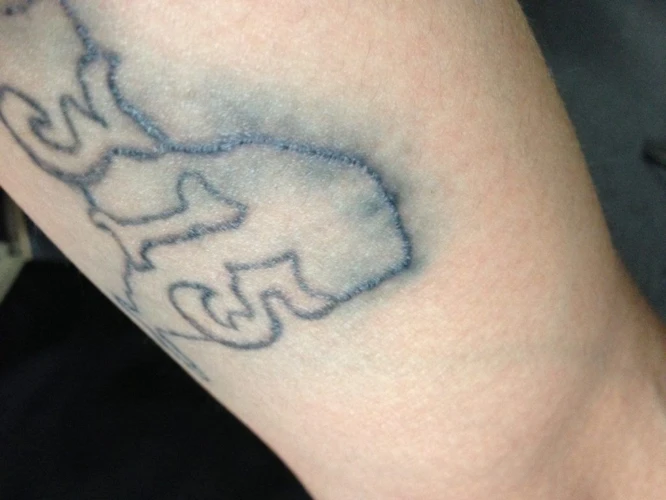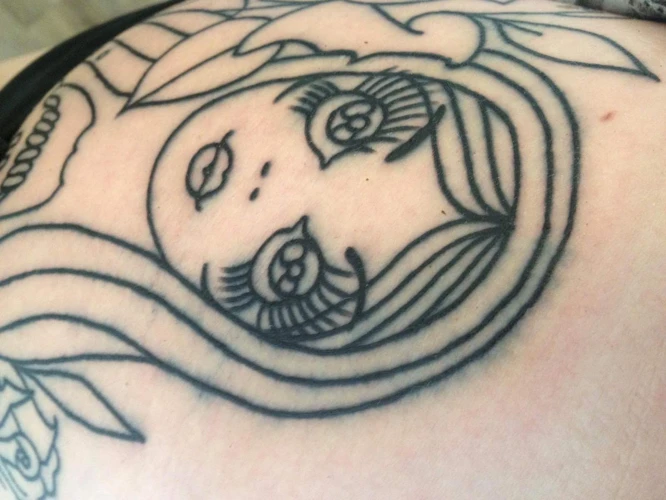Tattoos are a popular form of body art, but they can come with some drawbacks. One of the most common issues is tattoos bleeding, which can be a frustrating experience for the recipient. If you’re wondering why tattoos bleed, it’s important to understand what causes the bleeding and how to make your tattoo ink last longer. In this article, we’ll explore the reasons why tattoos bleed and provide some tips to help your tattoo ink stay vibrant for years to come.
Contents
What Causes Tattoo Ink to Bleed

Poor Quality Ink
Tattoo inks come in a variety of colors and consistencies. Low quality inks can be more prone to bleeding, as they contain more water and less pigment. This can cause the ink to spread out from the tattoo, which can lead to a blurry, smudged looking tattoo.
Poor Tattoo Aftercare
Taking care of a tattoo is essential for ensuring the longevity of the tattoo. Not following proper tattoo aftercare can lead to the ink bleeding and fading over time. This can include not protecting the tattoo with sunscreen or moisturizers, not keeping the tattoo clean, or not properly bandaging the tattoo.
Poor Tattoo Application
The quality of the tattoo application can play a major role in whether or not the ink will bleed. A tattoo artist who is inexperienced or uses poor quality equipment may cause the ink to spread out and bleed, resulting in a blurry, smudged tattoo.
Tattoo Placement
The placement of the tattoo can also have an effect on the amount of bleeding that occurs. Tattoos in areas with more movement, such as the hands and feet, can be more prone to bleeding as the skin is more likely to stretch and move.
Skin Health
The health of the skin is also a major factor in how much the tattoo will bleed. Damaged or dry skin can cause the ink to spread out, leading to a blurry tattoo. Taking care of the skin before and after getting a tattoo is essential for ensuring that the ink stays where it should.
Ultimately, it is important to take all the necessary steps to ensure that your tattoo ink stays in place and doesn’t bleed. Using high quality inks, following proper aftercare, and ensuring that the tattoo artist is experienced and knowledgeable can help prevent bleeding and make sure that your tattoo ink lasts for years to come.
How to Fix a Tattoo That Has Bled

Clean the Tattoo
It is essential to keep the area around your new tattoo clean at all times. This will help reduce the chance of infection and keep your tattoo looking vibrant for longer. Aftercare is key when it comes to making sure your tattoo ink won’t bleed and fade. Gently wash the area with warm water and a mild soap, then pat it dry with a clean towel. Avoid rubbing the area, as this can irritate the new tattoo and cause it to bleed.
Use Sterile Bandages
If your tattoo has bled and is still bleeding, use a sterile bandage to cover the area. This will help keep the area clean and protected. Change the bandage a few times a day and make sure to wash the area each time you take it off.
Apply a Healing Ointment
After cleaning and bandaging the area, use a healing ointment to help soothe the skin and keep the tattoo hydrated. This will help reduce the chance of infection and also keep the tattoo pigment from fading too quickly.
Avoid Skin Irritants
The skin around your tattoo is very delicate and can easily become irritated. Avoid using strong soaps, lotions, and perfumes on the area. These products can irritate the skin and cause it to bleed.
Avoid Excessive Sun Exposure
Direct sunlight can cause the ink to fade over time, and can also cause the tattoo to bleed. Be sure to use sunscreen on the area when you’re outside, and try to avoid prolonged sun exposure.
By following these steps, you can help ensure that your tattoo won’t bleed and that your ink will stay vibrant for years to come. If you are ever unsure about how to care for your tattoo, consult with your tattoo artist. They will be able to provide you with the best advice on how to keep your tattoo looking great. If you’re wondering why is my tattoo ink bleeding, following these steps should help you find the answer.
How to Make Your Tattoo Ink Last Longer
Use Quality Ink
Using quality tattoo ink is an important factor in making your tattoo last longer. Low-quality ink can have a higher tendency to fade or bleed, resulting in an unclear tattoo. Avoid using low-quality ink to prevent your tattoo from fading or bleeding.
Follow Tattoo Aftercare Instructions
Following the instructions given by your tattoo artist is essential for protecting your tattoo ink. Make sure to wash your tattoo daily and apply a thin layer of ointment to keep it moisturized. This will help prevent your tattoo ink from fading or bleeding.
Use Sunscreen
Protecting your tattoo from the sun is important to prevent it from fading or bleeding. Make sure to apply sunscreen with an SPF of at least 30 when you’re going outside. This will help protect your tattoo ink from the sun’s UV rays.
Visit a Professional Tattoo Artist
Choosing a professional tattoo artist is key to making sure your tattoo doesn’t fade or bleed. Professional tattoo artists have the experience and knowledge to create a tattoo that will last longer. Look for a reputable tattoo artist to help ensure that your tattoo ink won’t run or fade.
If you’ve been wondering why is my tattoo ink running, following these tips can help make sure your tattoo ink lasts for years to come.
Frequently Asked Questions
What other factors can cause tattoos to bleed?
Poor hygiene, incorrect needle depth, and too much pressure on the skin can all cause a tattoo to bleed excessively. Additionally, an artist’s inexperience and the use of inappropriate inks or needles can also lead to a tattoo that bleeds. Allergic reactions to the ink can also be a cause of bleeding. Finally, using too much water or ointment on the tattoo can cause it to bleed, as well as any attempts to scratch or pick at it.
Are There Any Methods of Preventing Tattoos from Bleeding?
Blood Thinners: Avoid taking any blood thinners before getting a tattoo. Blood thinners can make the blood vessels more fragile, which can cause the tattoo to bleed more.
Reduce Stress: Stress can cause the body to tense up, which can lead to more bleeding. Make sure to get plenty of rest before and after your tattoo session.
Stay Hydrated: Dehydration can make the blood vessels more fragile, which can lead to more bleeding. Make sure to drink plenty of water before and after your tattoo session.
Clean Skin: Make sure your skin is clean before getting a tattoo. This will help reduce the amount of bacteria and dirt that can enter the skin and cause infection.
Choose Quality Ink: Make sure to use quality ink for your tattoo. Poor quality ink can cause more bleeding and may not last as long.
Choose Quality Needles: Make sure to use quality needles for your tattoo. Poor quality needles can cause more bleeding and may not be as effective in delivering the ink.
What Type of Aftercare Should I Use to Ensure My Tattoo Ink Lasts Longer?
Proper Aftercare is Essential When it comes to making sure your tattoo ink lasts longer, proper aftercare is key. Here are some tips for keeping your tattoo healthy and vibrant for the long haul:
- Keep your tattoo clean and dry for the first few days. Use a mild antibacterial soap and lukewarm water to gently clean your tattoo twice a day.
- Once your tattoo is healed, use a moisturizing lotion to keep the skin hydrated and prevent fading. Look for a lotion that is specifically designed for tattoos.
- Avoid sun exposure and always wear sunscreen on your tattoo when outside. Sunlight can cause fading and discoloration.
- Avoid swimming pools and hot tubs, as the chlorine can cause fading and discoloration.
- Always consult with a professional before getting a tattoo to ensure that the artist is using the correct ink and technique.
By following these tips, you can ensure that your tattoo ink lasts longer and stays vibrant for years to come.
Are There Any Special Considerations When Getting a Tattoo in a Sensitive Area?
- Choose a Professional Artist: Make sure you choose a professional artist with experience in tattooing sensitive areas, as these areas require more expertise. Avoid self-tattooing or going to an inexperienced artist.
- Go Slow: When tattooing a sensitive area, go slow. Use lighter pressure and take more frequent breaks. This will help to reduce pain and bleeding.
- Take Breaks: Take frequent breaks during the tattooing process to allow your skin to rest and recover. This will reduce swelling and discomfort.
- Use a Lighter Needle: Using a lighter needle will reduce the amount of blood and pain experienced when tattooing a sensitive area.
- Use a Thicker Ink: Thicker inks will help reduce the amount of bleeding. This will also help to ensure that the tattoo lasts longer.
Can I use store-bought tattoo ink to make my tattoo last longer?
- No. Store-bought tattoo ink is not designed to be used on the body, and is not recommended by professional tattoo artists.
- Why? Store-bought tattoo ink contains preservatives, dyes, and other additives that can irritate the skin and cause discoloration or fading of the tattoo.
- What should I use instead? Professional-grade tattoo ink is designed specifically for tattoos and contains fewer additives that can irritate the skin or cause discoloration. Professional-grade tattoo ink is the best option for making your tattoo last.
Conclusion
Tattoos bleed due to a combination of factors, such as improper tattooing technique, incorrect needle size, or poor aftercare practices. To ensure your tattoo ink lasts longer, it’s important to find a reliable and experienced tattoo artist, properly care for your tattoo during the healing process, and regularly apply a high-quality moisturizer. Taking these steps will help ensure that your tattoo looks great for years to come.